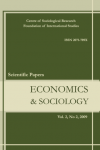IDENTIFYING THE ENVELOPE
WAGES PHENOMENON BASED ON
LFS AND SES DATA SETS –
EVIDENCE FROM POLAND
IDENTIFYING THE ENVELOPE
WAGES PHENOMENON BASED ON
LFS AND SES DATA SETS –
EVIDENCE FROM POLAND
Author(s): Wojciech Grabowski, Karol KorczakSubject(s): National Economy, Human Resources in Economy, Socio-Economic Research
Published by: Fundacja Centrum Badań Socjologicznych
Keywords: microeconometrics; mixed-effects model; simulations;
Summary/Abstract: This paper deals with the problem ofidentifying envelope wages based on the Labour ForceSurvey (LFS) and the Structure of Earnings Survey (SES).The research samples have been adjusted so that thedistribution of individuals in both databases is the same.The maximum likelihood method is used and theparameters of multilevel models that explain wages areestimated. Theoretical wages for selected workers groupsare calculated. Based on differences between thetheoretical wages of individuals from the LFS and SESdatabases, a measure associated with envelope wages iscalculated. The novelty of this study lies in providing anew method for evaluating the phenomenon of envelopewages. The analysis indicates that various features of theemployees and enterprises significantly affect thepropensity to receive an envelope wage. This propensityis also strongly determined by affiliation to a NACEsection. Regional differentiation of the propensity toreceive envelope wages was also identified. This problemis urgent in light of the negative demographic tendenciesin Poland and similar countries of the Central and EasternEurope that lead to an intensified competition foremployees. However, cost competition does not allow forsignificant increases of labour costs. Therefore, fiscalauthorities in Poland and similar countries should rethinktheir taxation policies.
Journal: Economics and Sociology
- Issue Year: 16/2023
- Issue No: 4
- Page Range: 130-154
- Page Count: 25
- Language: English

